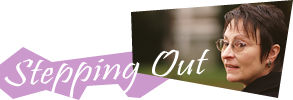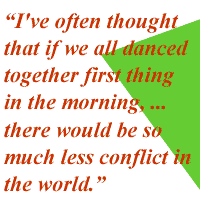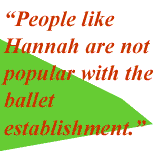
Chapter One: Dancin' at the U
Hannah Wiley had a fairly typical childhood in Spokane: two parents, both educators; two brothers. But her mother's self-described philosophy of parenthood was "keep them busy, keep them learning." So Hannah and her siblings were enrolled in a variety of activities, most notably music. Wiley's father was born with perfect pitch but never had a chance to develop his talent, and Wiley's mother was determined that her children wouldn't suffer the same fate. All three studied piano and each played another instrument. Hannah's was the cello.
It wasn't until fifth grade that ballet was added to Wiley's schedule, a move designed mainly to use up her considerable energy. "I just adored it," she says of that introduction to dance. She went on to dance almost continuously, spending summers during her high school years at well-known programs for young artists in Port Townsend and Banff.

Martha Wiley says now that she had no idea her daughter would become a dancer. She certainly didn't start out to make her one by offering dance lessons. Nevertheless, when Hannah graduated from high school, her parents told her that if she wanted to pursue a dance career in New York, they would support it.
At that point Wiley made the first of many decisions favoring breadth over immersion—she came to the UW. It was a campus, she remembers, teeming with opportunities for a young artist. She signed up for numerous courses in the School of Art, she played cello in the University Symphony, and she majored in drama. As for dance, she began by signing up for a modern dance class to fulfill a physical education requirement.
The class was a revelation, for Wiley says she was then a "bunhead"—dance slang for a devotee of ballet—and had never before seen modern dance. What impressed her was the attention the teacher paid to body mechanics.
"Ballet has been taught the same way for hundreds of years and it's mostly based on mythology," Wiley explains. "Biomechanics isn't considered; the joints are abused; you're encouraged to force yourself into positions no matter how you're built. So this class is where I first started questioning all that."
Another important experience during Wiley's undergraduate years was studying theater history with Richard Lorenzen. Then on the faculty in the School of Drama (he later directed Educational Outreach and is now at Northwestern University), he remembers Wiley as "extraordinarily bright and inquisitive, but like many artists, she didn't have much knowledge of history. I probably flatter myself, but I like to think I raised her consciousness about that."

History would play an important role in later chapters of Wiley's life.
When she graduated from the UW, Wiley didn't have clear career goals, but she accepted an offer to teach dance to preschoolers at Cornish College of the Arts. Feeling uncertain about her new role, Wiley asked the late Karen Irvin, then Cornish director, for advice. "She gave me some plastic flowers for my hair and said, 'Just make them love you,'" Wiley remembers.
She must have succeeded, because years later some of those preschoolers turned up in her dance classes at the UW, telling her they remembered her and their early training. But it wasn't the preschoolers who had a lasting influence on her later life; it was the adults she taught in an evening class. Wiley attempted to add some of what she had learned about body mechanics in modern dance class to her teaching of ballet. It was a method she would build on in the years to come.